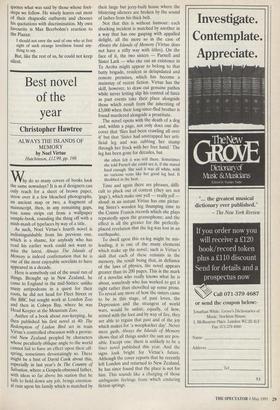Best novel of the year
Christopher Hawtree
ALWAYS THE ISLANDS OF MEMORY
by Noel Virtue
Hutchinson, £12.99, pp. 198 Why do so many covers of books look the same nowadays? It is as if designers can only reach for a sheet of brown paper, strew over it a few bleached photographs, an ancient map or two, a fragment of manuscript, then, in any remaining gaps, toss some strips cut from a wallpaper sample-book, rounding the thing off with a mish-mash of typefaces by way of a title.
. As such, Noel Virtue's fourth novel is indistinguishable from his previous one, which is a shame, for anybody who has read his earlier work could not want to miss the latest. Always The Islands of Memory is indeed confirmation that he is one of the most enjoyable novelists to have appeared in a decade.
Here is somebody out of the usual run of things. Brought up in New Zealand, he came to England in the mid-Sixties: unlike many antipodeans in a quest for their roots, he did not head for Fleet Street or the BBC but sought work at London Zoo and then in Colwyn Bay, where he was Head Keeper at the Mountain Zoo.
Author of a book about zoo-keeping, he then published his first novel at 40: The Redemption of Lisdon Bird set in train Virtue's controlled obsession with a provin- cial New Zealand peopled by characters Whose peculiarly oblique angle to the world cannot fail to have an effect upon their off- spring, sometimes devastatingly so. There might be a hint of David Cook about this, especially in last year's In The Country of Salvation, where a Gospels-obsessed father, with ideas so far above his station that he falls to hold down any job, brings emotion- al ruin upon his family which is matched by
their large but jerry-built house where the blistering silences are broken by the sound of lashes from his thick belt.
Not that this is without humour: each shocking incident is matched by another in a way that has one gasping with appalled delight, all the more so in the case of Always the Islands of Memory (Virtue does not have a nifty way with titles). On the face of it, the two sisters — Parnell and Sister Lark — who eke out an existence in Te Aroha might appear to belong to that batty brigade, resident in delapidated and remote premises, which has become a mainstay of recent fiction. Virtue has the skill, however, to draw out genuine pathos while never letting slip his control of farce as past events take their place alongside those which result from the inheriting of £3,000 when their long-since-fled brother is found murdered alongside a prostitute.
The novel opens with the death of a dog and, within a page, not only does one dis- cover that 'flies had been crawling all over it' but that 'Sister had unstrapped her arti- ficial leg and was rubbing her stump through her frock with her free hand.' The leg has been gone for decades, but she often felt it was still there. Sometimes she told Parnell she could see it, if she stared hard enough. She said it was all white, with no varicose veins like her good leg had. It throbbed in the heat.
Time and again there are phrases, diffi- cult to pluck out of context (they are not 'gags), which make one yell — really yell — aloud: in an instant Virtue has one pictur- ing Sister's wooden leg thumping time to the Connie Francis records which she plays repeatedly upon the gramophone; and the effect is all the greater for the perfectly- placed revelation that the leg was lost in an earthquake. To dwell upon this ex-leg might be mis- leading; it is one of the many elementi which make up the novel; such is Virtue's skill that each of these remains in the memory, the result being that, in defiance of the laws of physics, the novel appears greater than its 200 pages. This is the mark of a novelist who really knows what he is about, somebody who has worked to get it right rather than shovelled up some prose. To reveal any more of how the sisters came to be in this stage, of past loves, the Depression and the strangest of world wars, would be unfair; equally, of how, armed with the loot and by way of fire, they are able to regain that past and of the joy which makes for 'a woopkacker day'. Never mere gush, Always the Islands of Memory shows that all things under the sun are pos- sible. Except one: there is unlikely to be a finer novel published this year. And the signs look bright for Virtue's future. Although the cover reports that he recently left London and returned to New Zealand, he has since found that the place is not for him. This sounds like a charging of those ambiguous feelings from which enduring fiction springs.


















































 Previous page
Previous page